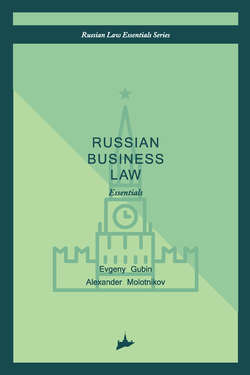Читать книгу Russian business law: the essentials - - Страница 19
Evgeny Arkhipov[15]
Chapter 1 – Business Legislation
9. The Judicial Practice
ОглавлениеThe legal system of the Russian Federation belongs to the Continental (Roman-German) type. One of the consequences of this system is that there are no judicial precedents in Russia: the courts are obliged to make decisions, being guided by laws and other legal acts, but not by other judicial decisions. The courts can not create new legal norms.
In practice, one should consider the following:
i) The generalization of judicial practice
The highest instance of the judicial system of Russia is the Supreme Court of the RF.[22] The Supreme Court of the RF is given the right to make explanations to inferior courts, concerning judicial practice on matters, with the basis of study and generalization (Clause 1 part 7 of Article 2 of FCL on Supreme Court of the RF). Such explanations are given in the decisions of the Plenum of the Supreme Court of the RF,[23] and informational letters of the Supreme Court of the RF.
In the decisions of its Plenum, the Supreme Court of the RF, expresses positions on the most important issues, as well as on those problems regarding which there were serious contradictions among inferior courts (for the purposes of correcting such contradictions and making the practice uniform).
Informational letters are descriptions of concrete cases; a short narrative of the court decisions made on the given cases, and the comments of the Supreme Court of the RF concerning whether the inferior court adjudicated the case correctly or not.
It should be noted that the Decisions of the Plenum of the Supreme Court of the RF, and the information letters of the Supreme Court of the RF, are the result of the generalization of judicial practice, and not the revision of the decision of the inferior court.
However, while interpreting a norm in the decisions of the Plenum the Supreme Court of the RF, it sometimes gives a meaning which is absolutely different from the one resulting from the literal interpretation of the writing.
Formally, the positions stated in the decisions of the Plenum of the Supreme Court of the RF and the information letters of the RF are not obligatory for other courts. However, in practice the situation is very different. The inferior courts strictly follow the decisions of the Supreme Court of the RF, therefore the specified acts have an obligatory character. Thus, the Supreme Court of the RF can actually change the meaning of this or that norm, and sometimes change it quite substantially.
ii) References to the court decisions on analogue cases
While preparing a position on a specific case, it is recommended to refer (whenever possible) to the court decisions on analogue cases. The judges listen to such arguments, and even in the final decision on the case, they sometimes indicate how a similar dispute was previously solved by another court. Moreover, the references should be made to the decisions of the Supreme Court of the RF, the courts of the subjects, and the arbitration courts of cessation. The court decisions, standing below, are seldom cited as an example. Practice shows that the party, whose position is supported with the court decisions on analogue cases, has a much better chance of winning the case.
Thus, while studying any aspect, one should analyze not only the federal laws and other legal acts, but also the acts of the courts on relevant issues.
22
The Supreme Court of Arbitration of the RF, which previously headed the system of arbitration courts, became part of the Supreme Court of the RF. For details, please, see Chapter on Litigation, Arbitration and Other Means of Legal Protection.
23
The Plenum of the Supreme Court of the RF is a part of the Supreme Court of the RF.
